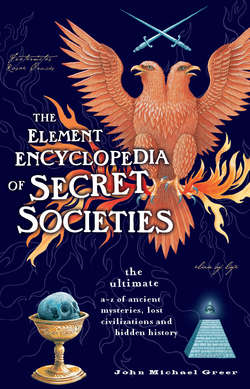Читать книгу The Element Encyclopedia of Secret Societies: The Ultimate A–Z of Ancient Mysteries, Lost Civilizations and Forgotten Wisdom - John Greer Michael - Страница 65
BACON, FRANCIS
ОглавлениеEnglish philosopher, author, lawyer, and possible secret society member. One of the most brilliant minds of the Elizabethan age, Bacon (1561–1626) was the youngest son of Sir Nicholas Bacon, Lord Keeper of the Seal to Queen Elizabeth, and his second wife, the classical scholar Anne Cooke. Lord Burghley, Elizabeth’s chief minister, was a close relative by marriage. These connections and his own precocious intellect brought him to Trinity College, Cambridge, at the age of 12. Graduating three years later, he entered Gray’s Inn to study law, and was admitted to the Bar in 1582.
A brilliant and many-sided scholar, Bacon envisioned his life’s work as the “Great Instauration,” a complete reform of scholarship and human knowledge. His writings included On the Advancement of Learning (1605), which played an important role in launching the scientific revolution, and the posthumously published The New Atlantis (1627), a utopian novel of a society centered on a “think-tank,” the House of Salomon, where all human knowledge was gathered, tested, and put to constructive use. He has also been credited with writing at least some of the works attributed to William Shakespeare. See Shakespeare controversies.
All this took place in the midst of a dazzling political career. In 1584 he entered the House of Commons, beginning a parliamentary career that only ended with his elevation to the peerage in 1618; 1591 saw him become a close associate of Robert Devereaux, Earl of Essex, a rising star in Elizabeth’s court at that time. Only when Essex shifted from politics to rebellion did Bacon abandon him, serving as counsel for the prosecution in the trial that ended with Essex’s execution in 1601. Knighted on the accession of James I, Bacon rose thereafter through the highest offices of the English civil service, becoming Lord Chancellor in 1618. In 1621 he was created Viscount St Albans, but in the same year his political enemies brought charges of bribery and corruption against him, and he was fined and imprisoned in the Tower. Pardoned by King James, he retired to his estates, where he spent the rest of his life in scientific and literary pursuits. He died in April 1626 from pneumonia contracted in an experiment to preserve a chicken by stuffing it with snow.
Bacon’s level of involvement in secret societies during his lifetime remains an open question. Among the plays he wrote while at Gray’s Inn includes one called Ancient and Honourable Order of the Helmet, and this order has accordingly been adopted into the legendary history of a number of more recent secret societies, notably the contemporary magical order Aurum Solis. In the literary and political war between the School of Night, the famous circle of freethinkers and occultists centered on Sir Walter Raleigh, and the supporters of the Earl of Essex, Bacon sided with his friend Essex, but – unless he was the author of the Shakespeare plays and poems – he does not seem to have contributed to the literary dimension of the struggle. See Aurum Solis; School of Night.
This may seem to offer only limited evidence for secret-society connections, but that has not prevented secret societies and their opponents from describing Bacon as a prominent member of esoteric secret societies, or even the leading figure in a world of secret societies underlying the Elizabethan Renaissance. Despite a complete lack of supporting evidence, he has been described as a prominent Freemason and one of the leading members of the Rosicrucian order, and some of his more enthusiastic supporters have credited him, or a secret society headed by him, with creating most of the great literature of the sixteenth and seventeenth centuries. Ironically, Bacon himself took a dim view of occult sciences, admitting at most that they ought to be searched for any scraps of real knowledge they might happen to contain. See Freemasonry; Rosicrucians.
A large part of this literature has based its claims on complex ciphers allegedly found in Bacon’s own acknowledged works, as well as those attributed to Shakespeare and other writers of Bacon’s period. Bacon himself was interested in ciphers, but attempts to use ciphers mentioned in his writings to decode hidden messages in Shakespeare’s plays have proved equivocal at best, turning out wildly different results depending on the personal biases of the individuals employing them.
Further reading: Pott 1900.
